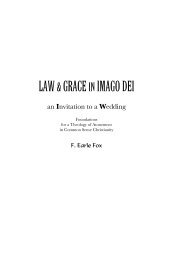Download entire 232-page book HERE (PDF ... - MassResistance
Download entire 232-page book HERE (PDF ... - MassResistance
Download entire 232-page book HERE (PDF ... - MassResistance
You also want an ePaper? Increase the reach of your titles
YUMPU automatically turns print PDFs into web optimized ePapers that Google loves.
Task sharing is seen by the child as an outgrowth of the 2 different parents’ shared commitment to<br />
their child and each other, and their willingness to bring their unique talents and interests to bear in<br />
doing the best job possible of raising their child.<br />
The Christian principle which underlies the concept of task sharing is unity, both the one-flesh<br />
unity of the marriage bond and the unity of the body of Christ. God gives us an excellent picture of<br />
this principle of diversity of function and unity of purpose at work in the church: “For even as the<br />
body is one and yet has many members, and all the members of the body, though they are many, are<br />
one body, so also is Christ” (I Corinthians 12:2). There is also the nature of God Himself to consider:<br />
in the Trinity, the three separate Persons function differently, even though they are One.<br />
Mutual reliance<br />
When the child observes task sharing, he/she also sees that each parent relies on the other to<br />
do their part. The child also witnesses mutual reliance in times of stress, such as emergencies or times<br />
of grief or sickness. The child sees that each parent is willing to rely on the other, and also to be relied<br />
on, even though neither parent has any real control of the other (as, for example, an employer would<br />
have over an employee). The child learns that it is possible to place trust in a person because of that<br />
person’s free-will commitment to be relied upon.<br />
Unselfishness<br />
Children constantly see examples of one parent giving up personal claims, interests or wishes<br />
in favor of the other parent. Often, for example, one parent will volunteer to take over the other’s<br />
child care responsibilities so that the other parent can participate in a special event. The child sees<br />
that each parent understands and empathizes with the needs of the other, even though those needs<br />
may be quite different. The child also sees both parents denying themselves various things in order<br />
to care for their children.<br />
The Bible gives us a perfect pattern for unselfishness in the sacrifice of Jesus Christ: “This is<br />
how we know what love is: Jesus Christ laid down His life for us. And we ought to lay down our lives<br />
for our brothers” (I John 3:16).<br />
Resource sharing<br />
In every family there are resources (money, time, use of car, etc.) that have to be shared.<br />
Parents both encourage a child to share and, together, model sharing for him/her. The parents<br />
demonstrate an especially profound kind of sharing -- sharing of their feelings, plans, dreams, trials<br />
and successes – in short, sharing a life together, even though the child sees that they are two very<br />
different kinds of person.<br />
The Christian teaching of sharing extends from the family to the community, as in this famous<br />
example from the first community of believers in Jerusalem:<br />
For there was not a needy person among them, for all who were owners of land or<br />
houses would sell them and bring the proceeds of the sales and lay them at the apos-<br />
Redeeming the Rainbow 80






